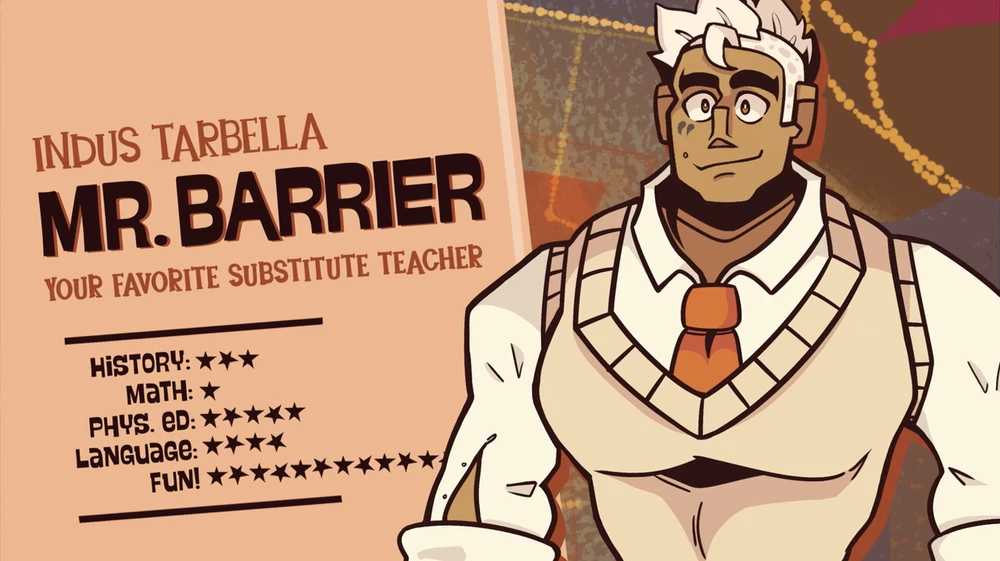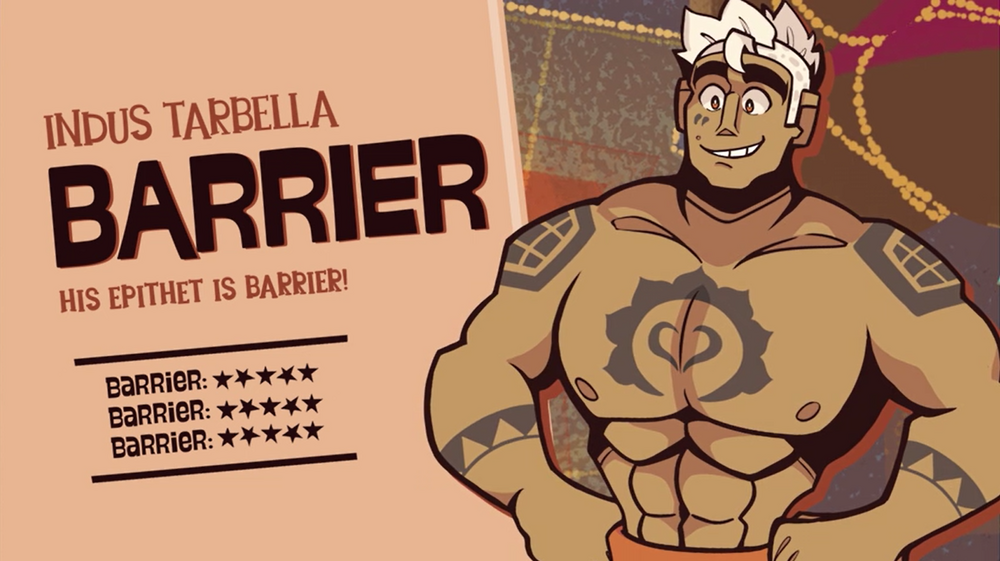The Inscribed, Epithet Variant (5e Class)
| Work In Progress |
Inscribed, Epithet User[edit]
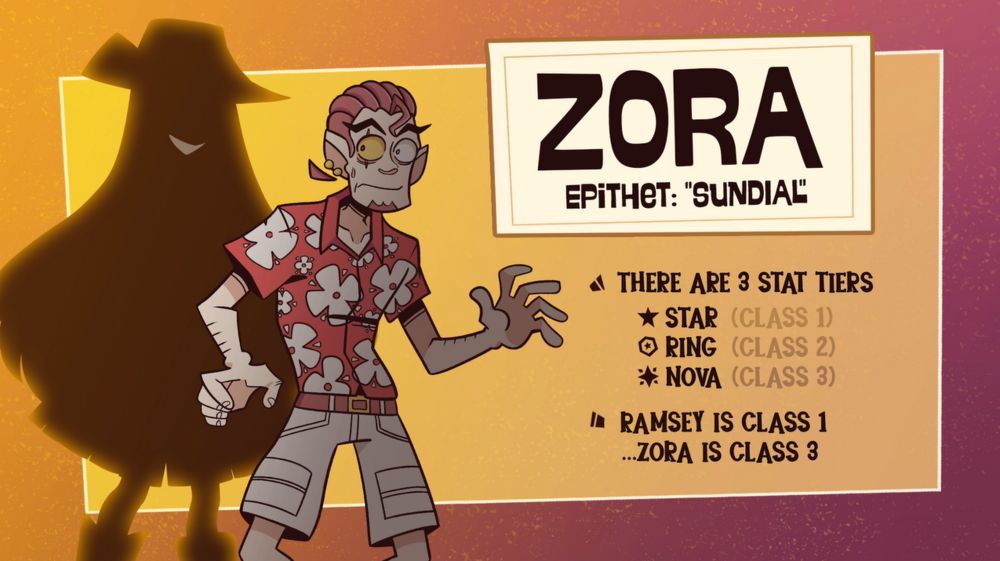
In the world of epithets, everyone speaks the same language, and that literally gives words power. Whenever someone is born there's a 1 in 5 chance that they become Inscribed, and those without epithets are Mundies, the inscribed have something special attached to their soul that lets them do special powers based off of what is attached, which can range from simple, the ability to make barriers, to surprisingly complex, like the ability to mute and "dumb down" almost anything, even the damage somebody takes, there is as many possibilities as there is things in the English language, However you don't need an epithet to be strong, so don't go acting all high and mighty if you have one, because you can lose to someone without one as easily as if they did.
Creating an Epithet Wielder[edit]
The first and most important thing for making an Epithet user is asking your DM to think of a random word, no you aren't allowed to pick it your DM has to. Now Write that down, (if its anything like the, and, or, etc. just think of another word) that's being saved for later. Now, what's their goal? do they want to have the strongest epithet? Do they want the Arsene Amulet to have all of the epithets? Or are they just looking for the amulet to gain reputation?
- Quick Build
You can make an Epithet Wielder quickly by following these suggestions. First, Wisdom should be your highest ability score, followed by Charisma. Second, make your sub-background "Inscribed" Yes that is required do it.
the hit die for the class depends entirely on the subclass
Class Features
As a Inscribed you gain the following class features.
- Hit Points
Hit Dice: 1d0 per Inscribed level
Hit Points at 1st Level: 0 + Constitution modifier
Hit Points at Higher Levels: 1d0 (or 1) + Constitution modifier per Inscribed level after 1st
- Proficiencies
Armor: Light
Weapons: Simple Weapons, Martial Weapons
Tools: None
Saving Throws: Wisdom, varies (see Epithet Path for more)
Skills: Arcana, then choose 2 of from the rest of the skills
- Equipment
You start with the following equipment, in addition to the equipment granted by your background:
- (a) Whatever you have on you in real life right now (in your backpack, pockets, purse, etc.) or (b) A set of leather armor
- (a) Any simple weapon or (b) Any martial weapon
- (a) A Gaming Set or (b) An Artisan's Tool or (c) An Instrument
- A pouch containing 4d4 gold if you are using starting wealth
| Level | Proficiency Bonus |
Features |
|---|---|---|
| 1st | +2 | Epithet Path |
| 2nd | +2 | Unarmed Combat, Unarmored Defense |
| 3rd | +2 | Epithet Path |
| 4th | +2 | Ability Score Improvement |
| 5th | +3 | Imbue |
| 6th | +3 | Epithet Path |
| 7th | +3 | Epithet Path |
| 8th | +3 | Ability Score Improvement |
| 9th | +4 | Epithet Path |
| 10th | +4 | — |
| 11th | +4 | Epithet Path |
| 12th | +4 | Ability Score Improvement |
| 13th | +5 | Epithet Path |
| 14th | +5 | — |
| 15th | +5 | Epithet Path |
| 16th | +5 | Ability Score Improvement |
| 17th | +6 | Epithet Path |
| 18th | +6 | Epithet Path |
| 19th | +6 | Ability Score Improvement |
| 20th | +6 | Epitome |
Epithet Path[edit]
Remember that word your DM came up with? Well that's your epithet now, congrats! However, to grow your epithet at all its gonna require ALOT of thinking and writing, so sit down and ask yourself these questions: What does the epithet do? (based around what the word is) Does the epithet effect the user? Is it a purely passive Epithet, or is it one that's activated? What's the epithet subclass? and one last thing before you start making the abilities: The DM is allowed to deny any abilities you make if they're seen as "too overpowered" or make no sense compared to your epithet. (you might not have an epithet that matches up perfectly with the premade subclasses, in which case you may have to improvise)
At 1st level, you chose a subclass for your epithet, this will also depict what your epithet does Choose between Tank, Reflection, Support, or Psychic, detailed at the end of the class description (Premade Epithet Subclasses). Your choice grants you features at 1st Level, and again at 3rd, 5th, 6th, 9th, 11th, 13th, 15th, 17th, and 18th Level. This will effect almost if not everything about your epithet besides it's main ability, so you have to pick carefully when choosing. You don't HAVE to use these and may feel free to discuss with your DM if you want to make a purely custom one, but using one of the premade subclasses is highly recommended.
Unarmed Combat[edit]
Beginning at 3rd Level, your unarmed strikes deal 1d6 of bludgeoning damage + your Strength modifier. Additionally, while you are not using armor and are not holding a weapon, you may make an extra unarmed strike as a bonus action.
Unarmored Defense[edit]
Beginning at 3rd Level, while you are wearing no armor and not wielding a Shield, your AC equals 10 + your Dexterity modifier + your Charisma modifier.
Ability Score Improvement[edit]
When you reach 4th level, and again at 8th, 12th, 16th and 19th level, you can increase one ability score of your choice by 2, or you can increase two ability scores of your choice by 1. As normal, you can't increase an ability score above 20 using this feature.
Imbue[edit]
When you reach 5th level, you gain the ability to imbue your epithet into objects, giving them special properties based off of what your epithet does. If you're using a custom Epithet, discuss with your DM what it does, but if you're using one of the premade subclasses, here is some examples for Imbuing:
Tank:
- The imbued object spawns a barrier when hit.
- The imbued object gains a small barrier around it.
- Cause the imbued object to shatter on command.
- Cause the imbued object to explode into pieces.
- Give the imbued object healing properties.
- Attack Towers can curve their shots towards the imbued object.
- Completely mute the imbued object.
- Dumb down anyone who touches the imbued object.
You may only imbue 2 objects at a time at level 5, but the amount of objects you can imbue increases by 1 every 3 levels.
Epitome[edit]
An Epitome is the strongest, absolute most powerful use of an epithet you can possibly squeeze out of your word. A few Nova-class inscribed can use their Epitome at will (Zora has one). Very rarely, in situations of extreme danger, a person who previously thought they were a mundie will unlock their epithet by way of unleashing an Epitome through the sheer need to survive. Think of it like the inscribed version of an adrenaline rush.
At 20th level, you gain the ability to use your Epitome. If you're using a custom Epithet, discuss with your DM what it does, but if you're using one of the premade subclasses, it is the final ability listed.
If you use your epitome, you cannot use it again until 2 in-game days have passed.
Premade Epithet Subclasses[edit]
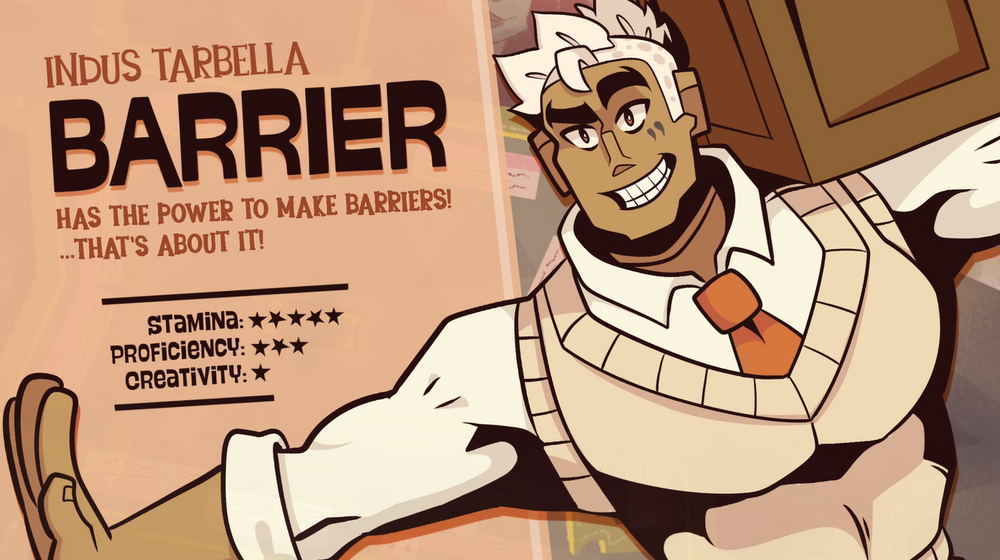
Tank[edit]
OH NO! Your friends seem to be in trouble! And you, being the defense, have to help them! And there's one, and only one way to help them! And that's with a B A R R I E R!
your second saving throw proficiency with tank is strength, and your hit die is 10.
- B A R R I E R
Starting at level 1, you may use an action to bend (or solidify) your epithet to form a barrier, these barriers can be up to 10 feet wide and 25 feet long, or small enough to hold , these barriers cannot be bypassed with piercing damage, have 25 hit points, and are just giant blocks of pure energy. You may (at max) create either:
- 5 small/tiny (5/5 feet and smaller) barriers,
- 3 medium (around 5/15 feet) barriers,
- 2 large (around 10/25 feet) barriers,
however there is more to the barrier limit:
- If you have at least 3 small barriers, you can only make 2 medium barriers,
- If you have at least 2 medium barriers, you can only make 1 large barrier,
- If you have at least 1 large & 2 medium barriers, you cannot make any more barriers.
The barriers may be moved telepathically, but only at 1/2 your speed, and moving more than 1 barrier counts as your turn.
- Hidden Barriers
At level 3, you may hide barriers you place/already placed, at level 2 you may only make 2 small hidden barriers, and 1 medium hidden barrier, however this will increase with your level.
- UN-BARRIER!
At level 6 you gain the ability to use your secret technique, every turn you can use a bonus action to UN-BARRIER and cause one barrier of your choice to self-destruct, removing the barrier does 2 things:
- Deals 1d4 damage to everyone standing within 5 feet of it when its removed.
- Pushes everyone standing within 5ft of the barrier back by 10ft.
- Barrier Improvement
At level 7, you can bring up the amount of barriers you can make by 1, along with other upgrades/conditions:
- You can only do it to 1 size (large, medium, small)
- Your barriers now have 50 hp.
- You don't get to summon more of the smaller sized barriers if you choose medium, so the same rules still apply (If you have at least 3 tiny barriers, you can only make 2 medium barriers) until you get more small ones.
- You may now summon tiny barriers around the size of your hand as a bonus action.
- BARRIER P U S H
At level 9, you can now use your action to force push a barrier out from where you're standing, as long as you meet these conditions:
- You must have room for summoning that size barrier, (if you wouldn't be able to summon the barrier normally, you cant push with that size)
- How far it can go depends on the size of the barrier:
*Tiny = 2 times speed *Small = speed *Medium = half speed *Large = 1/3 of speed (or closest to 1/3 in how far you can move, rounded down)
- Damage also depends on the size of the barrier:
*Tiny = 1 damage if you roll a natural 19, 2 if its a natural 20 *Small = 1d4 *Medium = 1d8 *Large = 1d10
- The barrier either disappears after you push with it, or stays at the cost of not being able to move it at all)
- "The first hit is mine!"
At level 11, you gain your first passive. If you ever are before someone in initiative, you may have advantage on your attack if neither of you have attacked yet, you can only use this once per battle, unless you go before everyone, then you may use it twice in the battle, you may do this 3 times per short rest.
- Un-Pierceable Self Defense/barriarmor
At level 13, you've allowed the full capability , allowing you to make barriers that cover yourself. When unarmored, you may create armor that equals the AC of the armor you had on most recently with none of the downsides (weight, disadvantage on stealth, etc.) until ANY armor is put on. There are some downsides:
- You may not create large barriers when using the barriarmor,
- You may not use barrier weapons while using barriarmor, and vice versa.
- Your barrier amount goes down to 2 medium and 3 small,
- If you have subclassed into something with unarmored defense, you cannot use barriarmor, unless you choose to get rid of the unarmored defense.
- Barrier Improvement 2
At level 15, you can bring up the amount of barriers you can make by 1 again, but under slightly (and only slightly) different conditions:
- You can only do it to 1 size (large, medium, small)
- Your barriers now have 100 hp.
- You don't get to summon more of the medium sized barriers if you choose large, because the same rules still apply (If you have at least 3 tiny barriers=only 2 medium, 2 medium=only 1 large, etc.) until you get more medium ones.
- The amount of hidden barriers you can make is now half of your barrier amount rounded up.
- Barrier Resizing
Omce you reach level 17 you may use a bonus action to resize any barriers you have summoned, there are some clauses:
- If you resize the barrier by more than 1 size then it costs a normal action.
- If you resize a large barrier in general it costs a normal action.
You can resize a large barrier to become even bigger, but there's even more clauses to that:
- Doing so ends your turn
- You must not have moved before you resize it
- If you want to move/un-barrier it, you must shrink it back down to large size
- Barrier Phase
At level 18, you gain the ability to move through your own barriers, however:
- You may not end your turn inside a barrier.
- If your movement ends inside the barrier, you cannot go through.
- You cannot move through barriers that you have resized past the "large" size.
- Tank Epitome: Honorable Duel
At level 20, you gain the ability to summon your epitome at will, and you are here to protect your honor. You may challenge anyone to an "Honorable Duel" at any time, and:
- Regardless of if they say yes or no, all current barriers disappear, and a giant indestructible barrier surrounds you and the enemy around a 30ft radius.
- All other living creatures are pushed away outside of the barrier.
- All weapons are taken from you and whoever you're dueling, and all magic used inside the barrier has no effects.
- The barrier will only disappear when someone either forfeits, falls unconscious, or dies.
- If you use your epitome, you cannot use it again until 2 in-game days have passed.
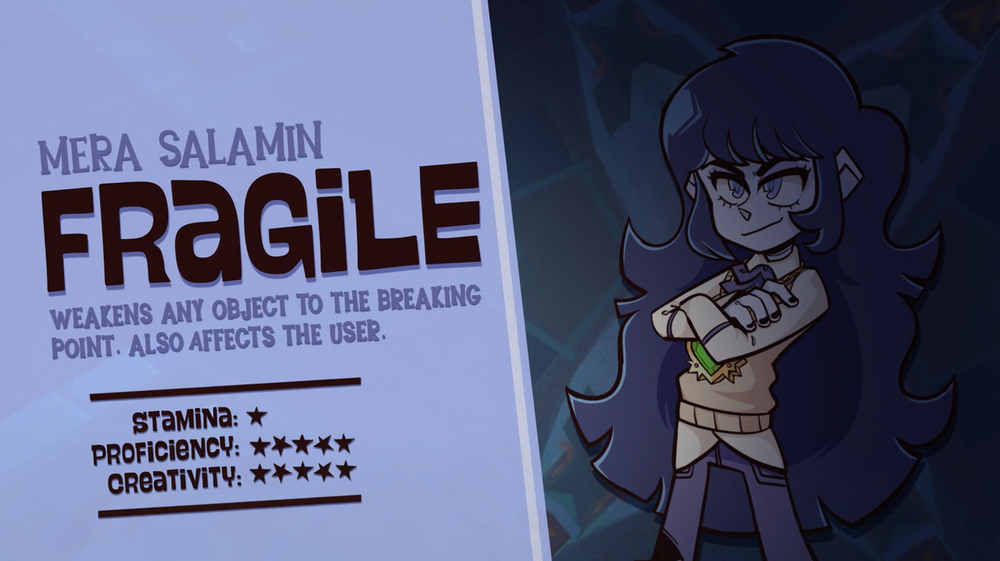
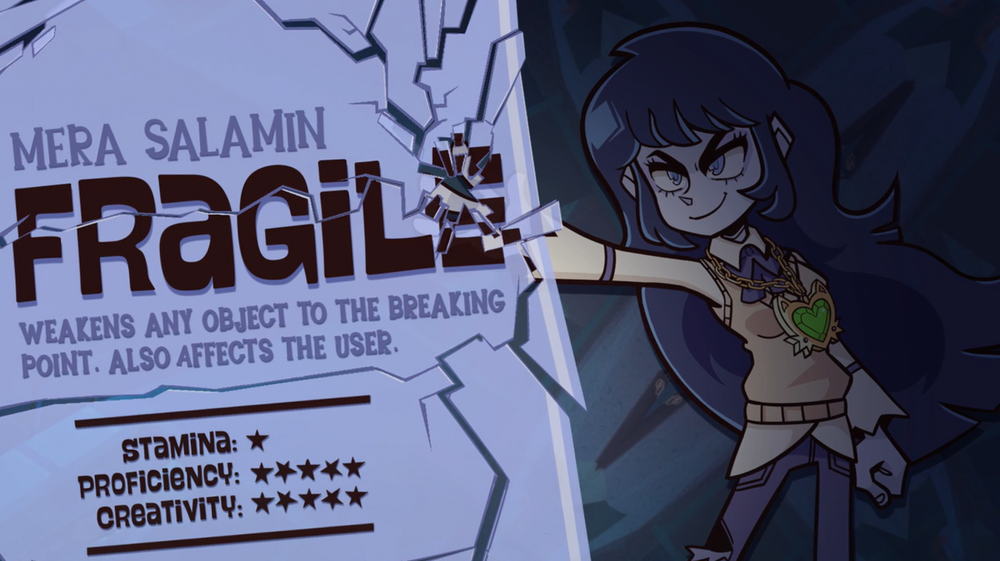
Reflection[edit]
You've never been a normal epithet user, being quite literally a glass canon at this point, you cannot use your epithet without your power boomeranging back to affect you. Life has been a living hell whenever you got into a fight, and it most likely wont get worse.
your second saving throw is constitution, and +2 In constitution, because your hit die is only 4
- Power At A Cost
At level 1, you have the ability to bring things to their breaking point with ease, at a great cost. whenever you use your epithet you take 1 damage.
and it's only gonna get worse than this from here
- Crystalline
At level 3, you gain the ability to create crystalline spikes, they can sting like a bee, but have the durability of a butterfly the spikes can be either a 5 or 10 foot wide attack.
- The spikes deal 1d6 piercing damage if its a direct hit (5 foot attack, hits 1 target)
- 1d4 slashing damage with bleed if it only cuts them. (10 foot attack, hits 2 targets, 3 damage)
- There is no limit to the amount of spikes you can create, but they do come at the cost of the 1 damage per spike you create.
- What Goes Up
At level 6, your epithets power goes up:
- the spikes do 1d8 or 1d6 damage
- the spikes can now be 7-16 feet wide (don't ask me how that will work on the grid)
and when your power goes up, you go down.
- you now take 1d4 damage per epithet usage (you still take only 3 damage for the 10 foot spike attack though)
- if you have any proficiency in strength checks, no you dont.
- A Butterflies Wing
They say the flap of a butterflies wing causes an avalanche on the other side of the world. At level 7, you can replicate that in a way. when next to a wall on your turn, you may use your whole turn to put your hand on the wall, and cause a chain reaction in another part of the area.
- the chain reaction cannot come within 10 feet of you
- as of right now, only 2 reactions may happen in the chain
- it must end with something falling over/collapsing
- you take 1d4 damage per reaction in the chain
- Watch Your Step
At level 9, you may get around with ease, as you may now create crystal skates on your feet.
- you may move an extra 5 feet.
- you can attack while still moving, but you may not crit any moving attacks.
- the skates go away after your turn.
- this move does not cause reflecting damage.
- you may use this move twice, then you need to complete a long rest to use it again.
- Are these even improvements at this point?
At level 11 it happens again:
- you can now move an extra 10 feet with watch your step
- you can now have a max of 3 reactions in a chain
- spikes now do 2d6 and 2d4 damage
and the cost for it:
- 3 damage per epithet use
- you lose 1 stat point in strength
- you now roll disadvantage to block attacks
- Scattergun
At level 13 you've learned a move that doesn't risk you getting punched in the face for once. upon using your epithet on any surface, you may break it apart and force the scattered remains at an opponent.
- it costs 1d8 hp to use
- deals 1d6 per person (2d8 if its all targeting 1 person)
- you may not do it to any object wider than 15ft
- you may only shoot the scattergun in a straight line
- the attack is 15ft wide at max, but you may shrink the width to attack 1 person
- Oh my god
At level 15 its gotten to the point where your DM probably regrets choosing this for you, because:
- extra 5 feet with watch your step
- max 4 reactions per chain
- 2d8 damage per spike
but:
- 1d8 recoil per epithet usage
- Watch Your Step does recoil.
- If you fail a skill check, you must roll to see if you take damage from it (same as if it was A.C.)
- "All I can do is steal from others!"
At level 17 you've finally found a way to stop your pain, but you're not so sure anybody else will like it. As an action, you may grab somebody, and suck the life out of them, taking 1d8 hp from them, practically giving them part of your fragility. Afterwards you may throw them like they would have to you, making a strength check with no modifiers.
- At this point I'm just sorry for doing this to you.
At level 18 you're probably not even alive still but:
- max 5 reactions per chain
- 2d6 lifesteal damage
- you get 1d4 extra hit points because I feel bad
- you may change the direction of scattergun once for 1 hp
and now for the bad part:
- you have a permanent AC of 10
- you may no longer critically succeed strength/dexterity checks other than your lifesteal
- Reflection Epitome: True Suffering
At level 20, you gain the ability to summon your epitome at will, and you intend to make sure others feel the suffering you do.
- Using up your entire turn, and skipping your next turn, you may use your epithet to turn someone's entire body as fragile as your own, cutting their current HP in half, and then dealing your current HP in force damage.
- After the damage is dealt, you lose HP equal to 1/2 HP the target has left.
- If you use your epitome, you cannot use it again until 2 in-game days have passed.
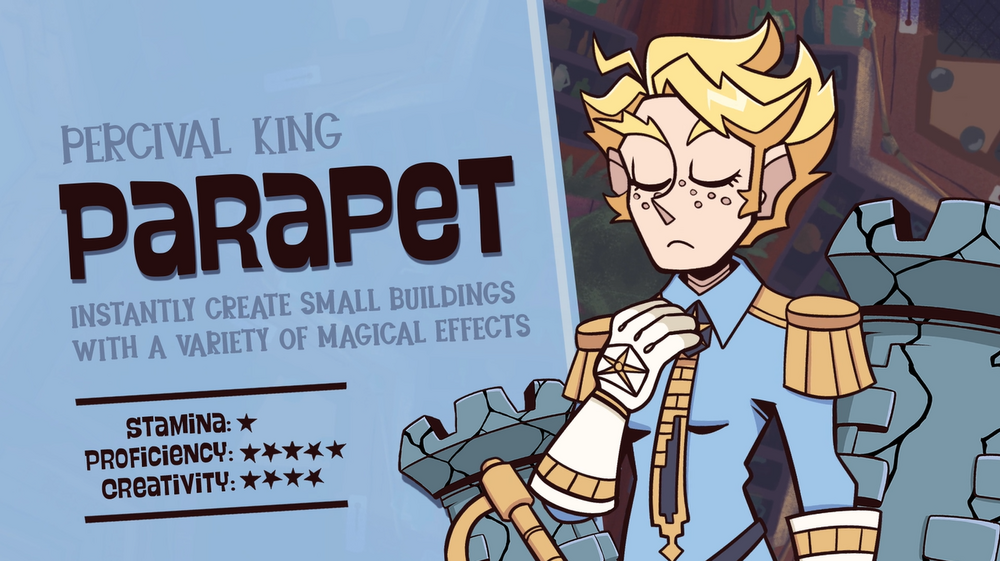
Support[edit]
Ah, the support class, the only one that remembers to help people because that's what the class is centered around.
your second saving throw proficiency with Support is Intelligence, and your hit die is 6.
- Support Tower
At Level 1 you gain the ability to place a small tower, which emits a pleasant healing aura.
- You may only have 1 Healing Tower standing at a time
- Healing Towers must be placed within of 30ft of where you summoned it from.
- It takes 1 action to remove/place a tower.
- Any character standing within 5 feet of it may heal 1d4 each turn, this applies to enemies too, as you cant control who it heals.
- All towers have 6 hit points, and an AC of 12, unless stated otherwise.
- Defense Tower
At level 3 you may summon another small tower, this one emitting a defensive aura, instead of a healing one.
- You may only place 1 Defense Tower at a time
- Defense Towers must be placed within of 25ft of where you summoned it from.
- Towers cannot be closer than 10ft from each other.
- Any character standing within 5 feet of this tower may raise their armor class by 1d4.
- Attack Tower
At level 6 you gain a ranged attack, in the form of another tower.
- You may have 2 Attack Towers out at a time, but you cannot have an Attack Tower and a Support Tower out at the same time.
- At the end of your turn, a random Attack Tower will fire a lightning bolt at a target within range of it, dealing 1d8 lightning damage.
- Attack Towers will disappear after 2 turns of not firing at anything.
- Tower Buff
At level 7, both you and your towers have grown in power.
- You may have 3 Support Towers out at a time.
- You may have 3 Attack Towers out at a time.
- You may have 1 Attack Towers and 2 Support Towers out, but you cannot use Attack Towers on anyone within range of your Support Towers.
- Healing Insight (passive)
At level 9, you gain an almost psychic sense for if someone is in danger.
- Whenever a character below 50% health is within 10ft of you, or within 5ft of a Healing Tower, you will be informed that they are currently injured.
- Once per battle, and 3 times per short rest, you may make a wisdom check to see a character's exact hit points.
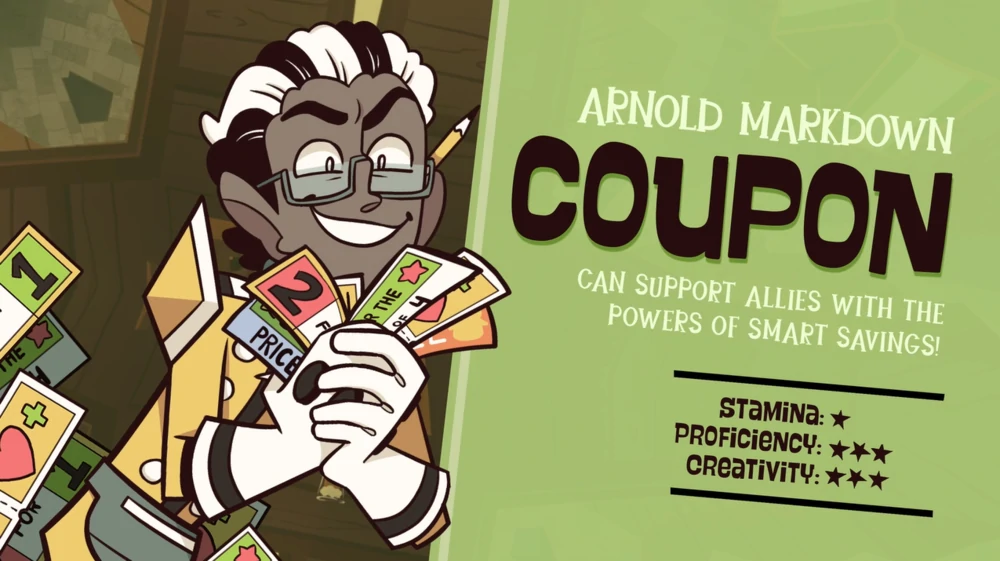
- Equal Exchange
At level 11, you gain an ability that doesn't involve your towers.
- As a reaction, when a party member within 15ft of you takes damage, you may exchange the damage for an equal amount counter attack & healing combination.
- You may not exchange the damage for 100% healing, you may exchange it at a 60/40 split at max.
- You may use this move once per battle, and twice per long rest.
- 2 for 1
At level 13, you may support your allies in battle, giving them a 2 for 1 deal they just can't pass up the chance on!
- As a reaction, when a party member within 15ft of you uses an Attack action, you may allow them to use an Extra Attack at no cost.
- If the party member misses their Attack, you may instead use 2 for 1 to allow them to try again.
- You may use this move once per short rest.

- "Let's be friends."
At level 15, you are able to support yourself rather than others, but support is support either way.
- You may form a bond with any player/npc to become "friends" with them.
- You gain the abilities of 1/3rd of a "friend's" current class level while you are "friends"
- If you ever stop being "friends" with the player/npc, you lose the abilities.
- You currently may only have a max of 2 "friends" at a time.
- Additional Support
At level 17, you have once again grown in power.
- You may use Equal Exchange at a 70/30 split.
- You may now use 2 for 1 on cantrips and up to level 3 spells.
- You may have up to 3 "friends" at a time.
- You now gain proficiency in skills your "friends" are proficient in.
- True Support
At level 18, you have become a supportive member that is not to be trifled with, and can stand on their own, but you're (hopefully) still there for others when they need you.
- You may have 5 Support Towers out at a time.
- You may have 5 Attack Towers out at a time.
- You may have 3 Attack Towers and 3 Support Towers out, and may fire Attack Towers at characters in range of Support Towers.
- You may use Equal Exchange at a 90/10 split.
- You may use 2 for 1 on any type of attack or spell.
- You may have up to 5 "friends" at a time.
- You now gain all the abilities and proficiencies your "friends" have.
- Support Epitome: "Fire."
At level 20, you gain the ability to summon your epitome at will, and you intend to provide a more offensive support.
- Unsummoning all your towers, you may summon 10 towers at once, firing at 1-2 target(s) to deal 4d20(1 target) or 2d20(2 targets) thunder damage.
- You fall unconscious after using this ability, and are forced to take a long rest.
- If you use this ability, you cannot summon any towers until you have taken a long rest.
- If you use your epitome, you cannot use it again until 2 in-game days have passed.
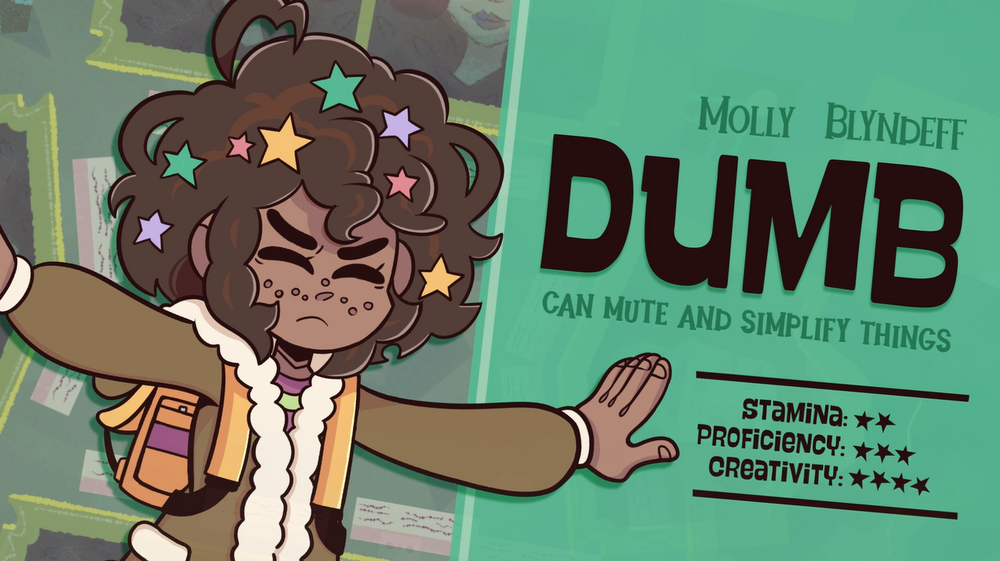
Psychic[edit]
Your epithet relies on the mental state of not only yourself, but those around you. Make sure to keep a calm and collected mind at all times.
your second saving throw proficiency with Psychic is Charisma, and your hit die is 8.
- Sixth Sense
At level 1, you seem to already know what you're doing in some sense, being able to tell if someone has similar powers.
- You have a special version of Detect Magic, casting it shows you exclusively if there is any mind-based magic/spellcasters in the area.
- You may cast this up to 3 times, before you need to perform a short rest to cast it again.
- Silencing
At level 3, you definitely have been thinking a lot to use your epithet. And honestly, you think people are too loud.
- You can mute any character within a 5ft radius of you, causing them to not make any sounds when moving or speaking.
- You can only mute up to 2 people at a time, and must unmute one of the 2 people before muting someone else.
- You have to be within 5ft to mute someone, but there is no range requirement to unmute anyone.
- Mute Bubble
At level 6, your mental powers have put you in your own little bubble compared to everyone else... Oh wait that's just an actual magic bubble hold on-
- If you have no muted people, you may create a 5ft magic bubble around yourself.
- The bubble does not reflect/block any sort of attacks, instead, it greatly softens everything people inside of the bubble hear outside of it, and vice versa.
- The bubble cannot be attacked (at least I've never seen it be attacked), and stays around you whenever you move.
- The bubble lasts for 5 hours, but can be desummoned at any time before that.
- You may do this 2 times before you need to perform a short rest to use it again.
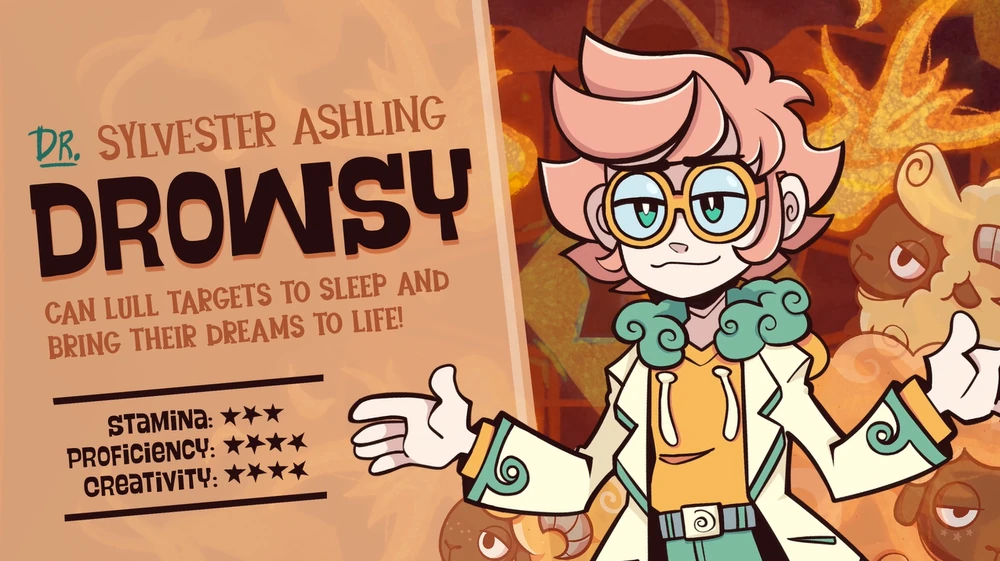
- The Sandman
At level 7, it seems your powers now have an effect on peoples conscience, able to make them tired.
- Create a cloud of yellow dust in a 15ft radius around you.
- Any living being in the cloud at the end of either your or their turn must roll a Wisdom save against you, gaining 1 exhaustion level if they lose.
- You may do this 2 times before you need to perform a long rest to use it again.
- Nightmare Fuel
At level 9, you have learned to bring the dreams of those you have tired out to life.
- If anybody within 50ft has 2 or more exhaustion levels, you may cast Nightmare Fuel, and manifest their worst nightmares in reality.
- If the target has no fears, or if their fears already exist in reality, Nightmare Fuel does nothing.
- If manifesting the target's fear creates a hostile enemy, that enemy will attack the closest character in range.
- Dumb Down
At level 11, the power you have over people's minds has only increased.
- You may choose any living creature, and roll an Intelligence save against them, "dumbing them down" to a level where they cannot think on their own if you win.
- As a Bonus Action, you may cast a special version of Suggestion on the "dumbed down" character, having no limit on the suggestion, making them believe anything you say about them regardless of how crazy it could sound. (Example: Using Suggestion to say something like "You're a car! And you really wanna hit (enemy) over there!" will make them genuinely believe they are a car trying to hit someone, only saying "beep beep" or other car noises and charging at the enemy.)
- You may use this ability 2 times before you need to perform a long rest to do it again.
- Seventh Sense
At level 13, your mind has grown further, along with your mental senses.
- You may mute up to 3 people, and the range for muting has increased to within 10ft.
- Your Mute Bubble lasts 10 hours, has increased to a 5ft radius instead of just 5ft, and now completely prevents sound from passing through its walls.
- Nightmare Fuel only requires 1 level of exhaustion now.
- Counting Sheep
At level 15, your power over people's sleep has grown once more.
- You may summon up to 6 sheep, all of which have a movement of 15ft, 30hp, have an AC of 12, and all produce the same yellow dust from The Sandman.
- If a sheep successfully attacks someone, that someone doesn't take damage, but gains 1 point of exhaustion.
- If any of the sheep die, you may not re-summon the sheep until you have performed a short rest.
- Hushabye
At level 17, the mental powers you have acquired have extended to effecting others' magic.
- As an Action, you may take a summoned creature within 5ft radius of you and "dumb it down" to nothing, completely de-summoning it.
- You may do this to creatures up to Medium size, gaining 1 exhaustion level for every size greater.
- You can perform Hushabye up to 5 times before you need to perform a short rest to use it again.
- Dream Bubble
At level 18, your powers over the mind have expanded enough to create an entire world of your own.
- You may create a Dream Bubble housing an entire reality of your own.
- You can alter anything about yourself or the area around you inside the Dream Bubble, even able to create passive or hostile creatures within them.
- To the outside world they are contained spheres that can vary in size, and are only way to enter without your permission or an epithet similar to yours.
- There is no limit to how many times you may use Dream Bubble before needing to rest, but you can only have 1 at a time.
- Once you remove a Dream Bubble, you must wait 1 in-game day before creating another.
- Psychic Epitome: Dream Big
At level 20, you gain the ability to summon your epitome at will.
- You immediately fall unconscious, manifesting any creature of your choice around your body.
- You gain all of the stats and abilities of the creature, and are in full control over it.
- If you are ever woken up, the manifested creature will disappear.
- You will automatically wake up after 8 in-game hours have passed.
- If you use your epitome, you cannot use it again until 2 in-game days have passed.
Multiclassing[edit]
Prerequisites. To qualify for multiclassing into the Inscribed, Epithet Variant class, you must meet these prerequisites: you may not multiclass into the inscribed, you must start with it.
Back to Main Page → 5e Homebrew → Classes





